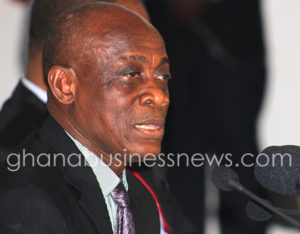Ghana on track to secure official creditors waiver for $360m third tranche – Terkper

Mr Seth Terkper, a former Finance Minister, has expressed confidence in Ghana getting a waiver from official creditors to support the approval of a third tranche of $360 million for the country.
Mr Terkper who led Ghana’s 16th International Monetary Fund (IMF) loan-support programme in 2015, said, “it may be difficult, though not impossible to secure another waiver because these are major waivers.”
The former Minister and current Executive Director of a consulting firm, Public Financial Management (PFM) Tax Africa Network, was speaking at a virtual media briefing on Friday, April 26, on the back of the country’s programme.
Ghana has reached an interim agreement with its official creditors, but yet to sign a Memorandum of Understanding (MoU) for debt treatment in line with the parameters of the programme.
While indicating that the MoU would not be a prerequisite for the disbursement of the third tranche, the Fund has also heightened the need for the country to ensure that a deal was reached with official creditors.
Mr Terkper stated that, “it’s not a type of waiver, where we’ve probably fell short of fiscal target by a 0.5 per cent or others, and we promised that we’ll be able to surmount. Reports are that all these problems are surmountable.”
His optimism is on the heels of the country having previously secured a waiver from France and China [Official Creditors Committee Chairs] before the current loan-support was approved last year, just as it was done in the first review.
He encouraged the government to take bold measures to ensuring that enough buffers were created to be able to cater for debt repayment, and reduce the accumulation of same.
“If you do not set aside money for debt repayment when you’re growing, it’s a mirage, you can never reduce your debt accumulation,” the former Finance Minister emphasised.
That, he said was required as the country’s revenue at the end of the three-year programme would not be boosted as expected, which together expenditure projections would not be enough for debt sustainability and economic resilience.
Ghana’s total revenue and grant for 2022 was 15.8 per cent of Gross Domestic Product (GDP), and is expected to reach 15.7 per cent 2023, and 16.7 per cent in 2024.
In 2025, the country’s revenue is expected to be 17.3 per cent, 2026 – 18.2 per cent, 2027 – 18.1 per cent, and reduce further to 18.0 per cent in 2028.
Expenditure, which stood at 27.7 per cent of GDP in 2022, is expected to reduce to 20.4 in 2023, with a marginal increase to 21.7 per cent in 2024, but reduce to 21.6 per cent in 2025 per the programme’s projections.
In 2026, it is projected that Ghana’s expenditure would increase slightly from the previous year to 21.8 per cent, and reduce to 21.2 per cent in 2027, before another decline to 21.1 per cent in 2028.
Mr Terkper attributed this development to the uncertainty as to when the domestic modernised and automated tax system [Integrated Tax Administration System, ITAS] would be completed, and the unambitious nature of the programme to increase tax-to-GDP ratio by a two-percentage point.
“Ghana needs to do more on its own, including setting up a credible debt repayment mechanism like the Sinking Fund [a financial reserve set aside to cover the cost of specific future expenses],” he recommended.
He urged the government to use the Energy Sector Recovery Act (ESLA) to pay off Independent Power Producers (IPP) debts, as the Bank of Ghana kept ensuring that it kept to the zero financing of government expenditure.
Source: GNA
